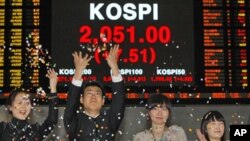Most of Asia's stock markets marked a year of gains in 2010, buoyed by economic recovery and higher commodity prices. But economists say markets may face tougher times because of inflation and slower growth.
Share indexes in Thailand and Indonesia both rose more than 45 percent this year. South Korea's KOSPI index gained more than 20 percent despite tensions on the Korean peninsula.
But in China, government efforts to slow the economy contributed to a 15 percent loss on the Shanghai index. And Japan's Nikkei 225 lost about 3 percent. Overall, the MSCI Asia-Pacific stock index marked a 15 percent gain for 2010.
Several global investment banks, such as HSBC and Morgan Stanley, expect most developing Asian stock markets to continue climbing in 2011. Some banks forecast average index gains of about 20 percent in the region.
In Thailand, shares rose despite anti-government demonstrations that led to more than 90 deaths in the first half of the year. Anusorn Buranakanonda, a Bangkok fund manager, says a more stable political climate in 2011 will underpin the Thai market.
"The analysts have a consensus that the market could continue to grow 10 to 15 percent and healthy sectors would be the banking sector of course, construction because the government has a lot of public spending to come on stream, telecommunications, energy and consumer spending," Buranakanonda said.
Slower growth ahead
But there are concerns for Asia's markets in the coming year. Market analysts say they could be undermined by inflation and rising interest rates. While Asian economies are expected to grow steadily in 2011, growth will not be as robust as it was this year.
The United Nations Economic and Social Commission for Asia and the Pacific forecasts regional growth will fall to 7 percent in 2011 from 8.3 percent this year.
Nagesh Kumar, chief economist and director at UNESCAP, says that slower growth reflects declining export demand in Europe and the United States.
"There was nearly a 'V' shaped recovery in 2010 and now, as we go into 2011, you see the growth momentum tapering off, essentially driven by the developed economies but also affecting the developing countries," said Kumar. "The export growth has begun to taper off and that is a sort of leading indicator for macroeconomic performance."
U.S. economic policy
Kumar says the region is closely watching the U.S. Federal Reserve's loose monetary policy, intended to stimulate the economy.
"This policy, which is essentially printing of more dollars or more currencies, is causing hardships for other regions where growth is still robust. So it's finding its way to Asia-Pacific and causing a lot of other effects like inflation, asset price bubbles, exchange rate appreciation,” he said. “So we have to deal with that challenge."
Central banks may try to contain inflation by raising interest rates, and that might encourage investors to shift money away from stocks and into bonds as rates rise. Commodity prices also have been rising, adding to inflationary fears, especially in the growing Asian economies.
Gold gained over 28 percent over the past year to trade on Friday at $1,407 an ounce, while silver is at 30-year highs.




